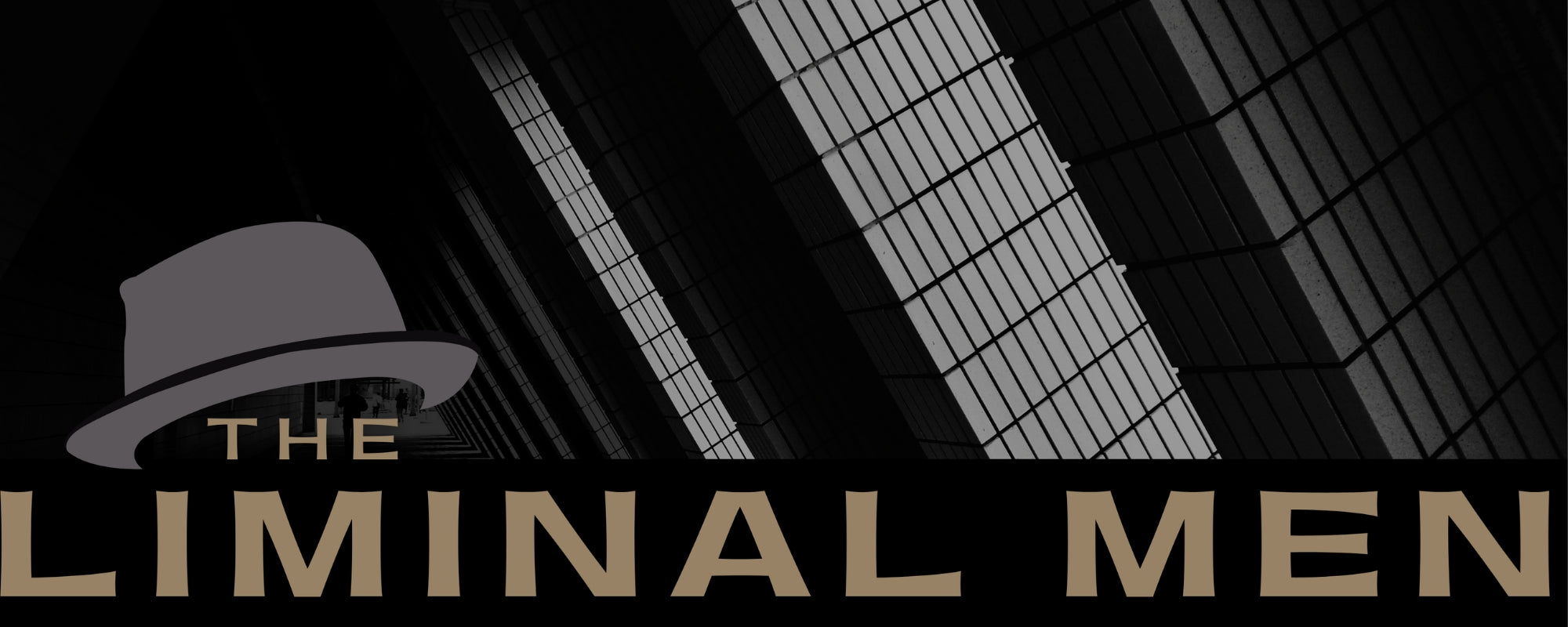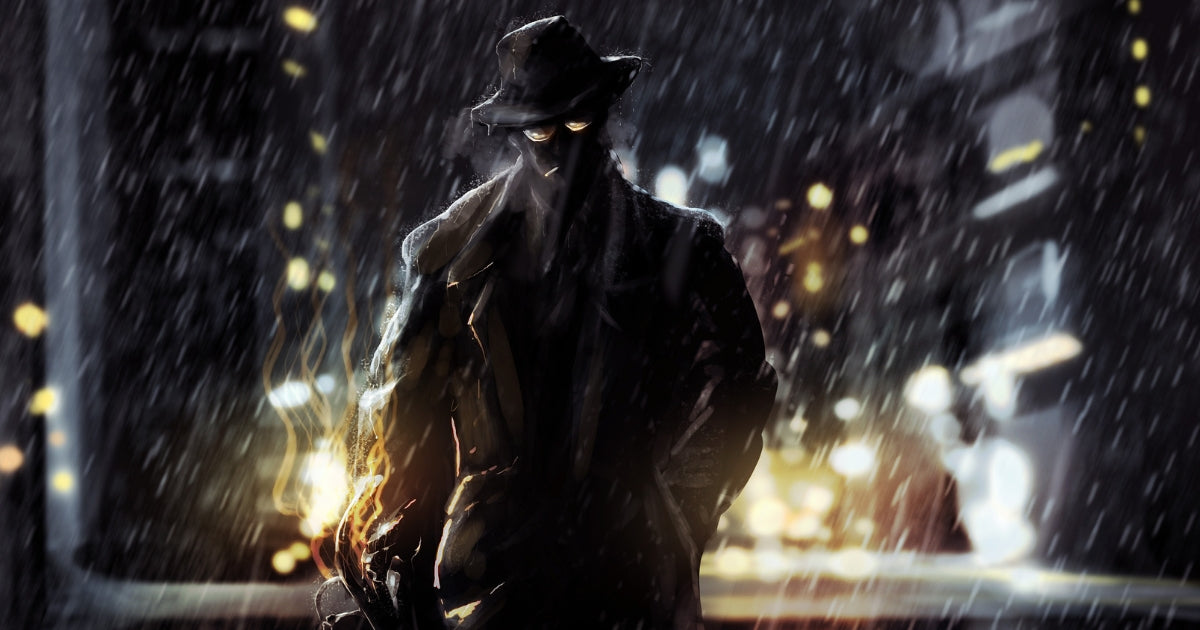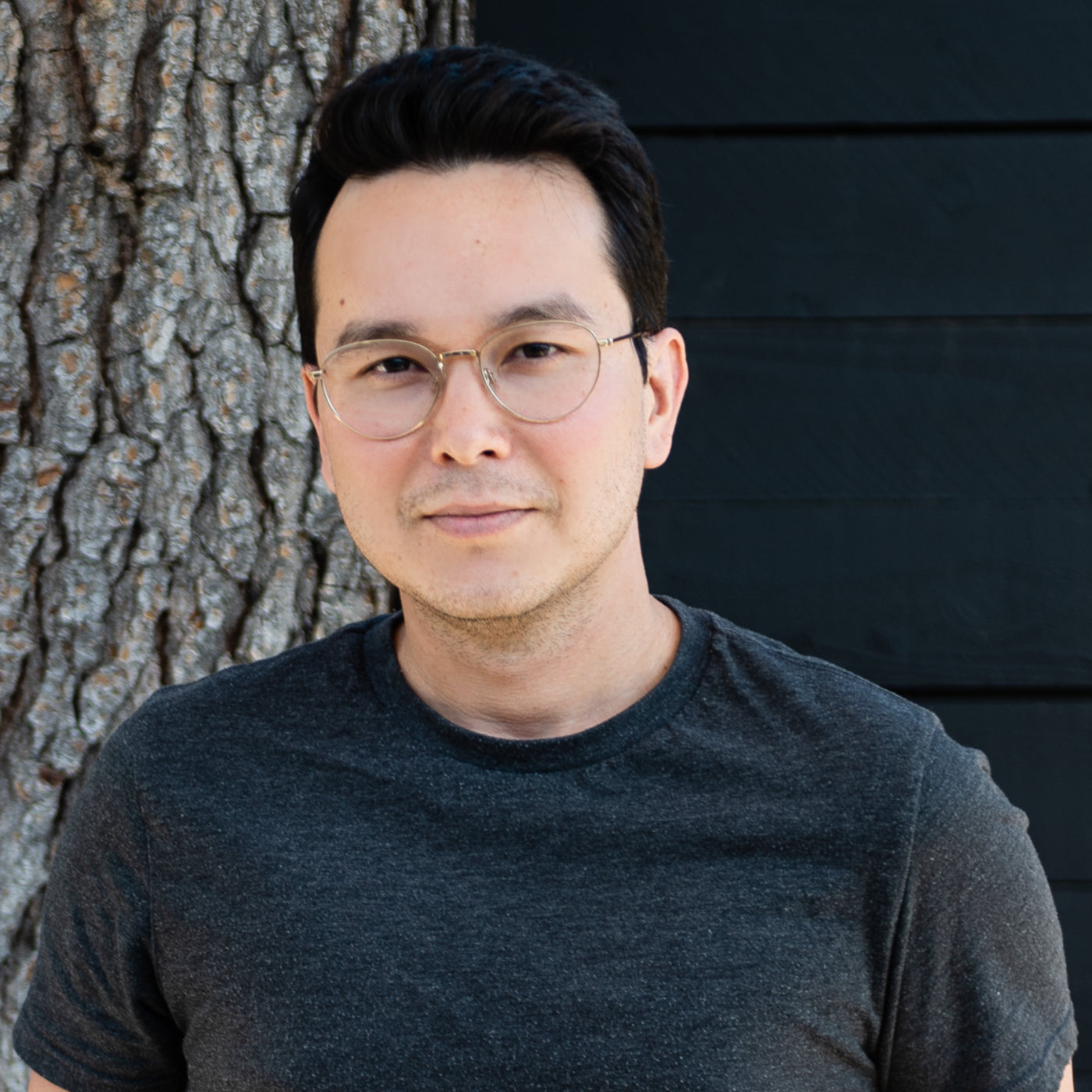

The Liminal Men
By Thomas Ha
The next time he comes looking for me, I’m wide awake.
Without drawing back the curtain, I can feel him standing outside the brownstone in the dark, waiting at the city sidewalk, just beyond the reach of the streetlight. The passersby can’t see him the way that I can, because he’s made sure to erase himself from their minds. But a few still know he’s there by the sweet odor around him, like bananas left in the sun, or honey and clover, and they walk noticeably faster, while others who are none the wiser continue into the night unhurried.
Never look them in the eye. No matter what, Jamie used to tell me when we were boys. If they know you can see them, it’s over. He’d make me practice in busy subway stations and at public events. I’d stand near the liminal men as they moved through the crowds, hunting. I got so good at it that they could hover over me with that gross, sweet breath, and I wouldn’t flinch or move a muscle, just stare through them like they were smoke.
But, what I’m about to do now goes against pretty much everything Jamie taught me.
I summon the courage to look directly out the window, and I meet the liminal man’s unnaturally large and unblinking eyes. He stares back at me from the curb, his pallid face floating under the wide brim of his black hat. Like all of the liminal men, he has that sickly rictus that makes him look like a smiling ghost, and his wet teeth click sporadically, as if he’s remembering how to talk or whispering to himself.
He can feel me, and he’s trying to read me now.
When they do that, make your mind like dark water, Jamie used to say every time we came to one of the city checkpoints. He’d kneel and adjust my collar, making me repeat it back to him quietly. Think of nothing, other than what’s in front of you, and reflect that. Don’t let them see what you’re thinking under the surface. Every time we’d get near the front of the line, where officers were waiting to check our licenses and question our reasons for crossing neighborhoods, I would keep my eyes away from the liminal man standing at the chain link fence. Any wrong thought, and he’d whisper to the officer to take us aside. I’d seen grown men thrash and scream and others go limp as the Ministry men dragged them away from the checkpoints. Sometimes it was because they were flagged, other times they said the wrong thing during questioning, but most often, it was because the liminal men saw something dangerous in them.
It takes everything in me to overcome my instincts as I break another one of Jamie’s rules. I don’t hide what I’m thinking at all as I look out the window.
I want the liminal man to know.
His eyes grow even larger, his breathing more excited.
The thing they enjoy most, more than catching Free Thinkers, is finding people like us, do you understand? Jamie whispered to me and held my wrist so tightly I thought he was going to break it. You can never, and I mean never, use your cerebral abilities around them. Use your words when you talk to me, not thoughts. Words only.
I tell myself that Jamie would understand why I’m not following his advice.
<I’m here.>
I push the thought toward the liminal man, like a boat moving across the water, and the moment he hears me speak in his mind, he shifts eagerly. I withdraw from the window, further into the house, and wait for his approach.
Everything is still until I hear the first creak upstairs. He’s crawled up the side of the house, it seems, and has come in through one of the bedroom windows. I watch the ceiling as I reach over, turn on the record player, and drop the needle. The song that plays is one of my favorites, “Without Wonder in the World,” by the Williams Brothers, a rock ballad from their early years, before they were banned by the Ministry for sedition.
After our parents were taken, and it was just Jamie and me on our own, we used to argue all the time about this song. He hated it when I went to underground stores for blacklisted music, and he warned me that it was a breeding ground for Free Thinkers and other dissidents, which was not the deterrent he thought it was.
As I got older, and a little more rebellious, I wanted to express my anger with the Ministry, so I played this song constantly, soft enough that it wouldn’t carry out of our home, but loud enough that Jamie would always have to hear it. I couldn’t understand, then, how hard it must have been for him to take care of the both of us all by himself, even without me screwing around that way.
The Williams Brothers’ crooning fills the house, and I hear the liminal man stop in his tracks. He already knows I’m cerebral, so I don’t hide the fact that I’m using my abilities to connect to his mind and feel his reactions. The soft bass and snare drums join the guitars, and the liminal man turns his head. It’s stirring something, but he doesn’t understand what.
<I’m here.>
I ping him again.
The liminal man shakes off his hesitation and approaches the top of the stairway. With each step he takes, he passes the photographs that I hung on the wall. The picture of me as a baby in my mother’s lap, and Jamie, with a bowl cut, sitting with our dad. The next photo of me and Jamie fishing on our uncle’s boat. He lets me hold the bigger fish he caught, both of my hands above my head. Then the last photo, a portrait of Jamie when he graduated from high school. His hair is dark and shaggy, his grin confident and his eyes steely.
The liminal man stops at the last photo the longest.
<I’m here.>
I go to the kitchen and open the oven door, letting hot air billow so that the smell of the lasagna can fill the house. It’s the only recipe our mother ever taught Jamie, so we used to have it all the time, frozen and ready to microwave when I came home from school, or set out on the table on Sunday nights, when he’d make us eat together. I still look back on those dinners fondly, even the tense ones in the later years, when we’d mostly argue about politics. The oregano, rosemary, and garlic all seep into the air, and I realize I’ve burnt the lasagna as I turn the oven off. But that doesn’t much matter, so long as the liminal man can take in the aroma.
I feel the liminal man pausing at the entrance to the living room, like he’s lost his balance. The smell is doing what it’s supposed to, stimulating the parts of his brain that have been remade, bringing little images and emotions that surge through him like crackles of lightning.
He takes off the wide-brim hat and holds it against his chest. The ratty strands of his greasy, patchy hair trail down his scalp around the intertwining web of scars where his skull has been cracked open repeatedly.
Cautiously, I emerge from the kitchen, my hands raised.
“I’m here,” I say, using my words.
The liminal man’s eyes snap to me, and I realize that I haven’t given him enough time. He lunges across the room, and his elongated fingers wrap around my throat just as I raise the modified magnesium lamp.
When I hit the charge, the powder ignites and smoke plumes from the long bar in my hand, setting off a brilliant, white flash that fills the space around us. The liminal man freezes in place, his brain arrested by the wavelengths released from the magnesium reaction.
This was one of the first techniques the Free Thinkers taught me. It was discovered accidentally by an amateur photographer in Denver, who, so the story goes, was trying to get around the Ministry’s ban on cameras by tinkering with early flash photography equipment. What he found, instead of a way of lighting his subjects, was a method of confusing and paralyzing the liminal men. Something about what the Ministry did to their minds made them susceptible to this light and put them in a nearly catatonic state for several minutes.
The liminal man continues to stand in place, his mouth agape and eyes unfocused, while his body slightly trembles, and I lay out more powder on the bar in case I need to use it again.
“Listen to my voice,” I say. “My voice. Listen to it.”
I let my voice, the music, and the aroma from the kitchen continue to work on his mind as intended. Color seems to be seeping into his ashen skin at his jaw and around his neck. The normally impermeable shell around the liminal men that makes them impossible to injure, a combination of chemical treatments to their skin and a cerebral focus that hardens their bodies like iron, fades gradually. He is reverting, and even as the effects of the magnesium flash wear off, he looks at me sleepily and childlike.
He’s blinking, and the wide curve of his fixed grin begins to drop as his facial muscles relax.
“Good,” I say calmly, now that I have regained control. “Come with me.”
I take the liminal man by the arm and lead him to the kitchen, seating him at a round table. He stares around with curiosity, as if he’s taking
in these surroundings for the first time, not knowing he has done
this before.
He pauses and studies my face for a minute, almost like he understands who I am, and he tries to mouth something. During previous visits, I would have attempted to explain things, but I’ve learned it isn’t effective, since he can’t take in new information that way.
“Yes,” I simply tell him comfortingly. “Sit here. Okay?”
My surgical tools are laid out on the counter, sterilized and ready for me to continue where we left off. The Williams Brothers are still singing from the record player while I don my face mask, gloves, and operating garb. When I’m ready, I drag a scalpel carefully along one of the main, fresh scars on the top of his head; like all of their wounds, it’s already healed at an accelerated rate since the last time.
I tell the liminal man to stay perfectly still, and he feels nothing when I cut around his softened skin to find the main metal plate, easily removed and
designed for ready and repeated access. I place it on the table on top of a towel.
<It’s okay.> I comfort him with my cerebral abilities. <I’m here.>
It was what Jamie used to say to me, usually while I cried in bed and he brushed the hair from my eyes, whenever I had the nightmare where the liminal men were going to take me, just like they did our parents. And the only thing that calmed me was Jamie speaking directly into my mind.
<It’s okay. I’m here.> He used to say.
The liminal man does not move while I set parts of his brain matter aside, but we are still connected in our thoughts, and I can feel him questioning.
I inspect the spider-like device on his frontal lobe more closely, following the wires that seem to deaden portions of his brain while stimulating others. My best guess is that the mechanism hinders foresight and areas integral to decision making, while enhancing other areas of the parietal lobe that give some of us our cerebral abilities.
Part of me expects to hear the telltale, rhythmic clicking from the device, the sign that it’s beginning to reset. When it does that, I only have a few minutes before the Ministry’s controls reassert themselves.
But, today, I’ve been delicate and quick, so I seem to have more time.
I’m still unable to remove the device without damaging the surrounding tissue, but each time we do this, I learn just a bit more.
Perhaps, just maybe, I’ll be able to figure this out.
“What in God’s name…”
A voice carries through the kitchen.
Without turning, I know Wilbur has come to check on me. He’s the only other Free Thinker with a key to the safehouse, so it was just a matter of time until he’d be by.
I grip the scalpel tightly.
He steps around me and slowly removes his hat, then leans over my shoulder, too close, as if reminding me how much larger than me he is.
“You’ve really done it…” Wilbur mutters, staring at the liminal man’s open skull. “He’s reverted.” His face twists into a big smile. “They can be killed, after all.”
I say nothing.
Wilbur’s smile disappears. “Good for you, cerebral boy.” He sits down at the round table across from the liminal man, and his mouth twitches a little. “When you didn’t check in, I thought you’d been taken or turned. Why didn’t you tell us you’d gotten this far?”
I wipe my scalpel and place it next to my other tools on the counter. “I was going to, but I wanted to confirm a few things first.”
Wilbur peers at the parts of the liminal man’s brain that are in the open. “What’s to confirm? Look at him. Bastard doesn’t even know he’s done for.”
“Yes, well…” I clear my throat. “I’d appreciate it if you could step out of the area for a few minutes. I’m not quite finished.”
“Oh?” Wilbur’s dark eyes drift to me. “Am I getting in your way?”
“No, that’s not exactly what I meant. It’s just–”
“This experimental stuff is better for your type, right?”
“No.”
“I’m better off out there, holding off the officers and liminal men.”
“I didn’t say that.”
“Good.” Wilbur leans forward. “Because I think I want to stay. Not every day you get to see what happens when a liminal man dies,” he says. “Look at it. His skin, so soft, there’s probably a dozen ways you could do it.”
I don’t reply.
“Go on,” Wilbur presses. “Drag that little blade across his throat. Or better yet, stick it in his noggin and scramble his eggs.”
I don’t need my abilities to read the cloud around Wilbur, the one that tells me that I need to tread very carefully. He senses my hesitation and grows more agitated.
“What are you waiting for?” he asks. “Isn’t this why you’re here?”
I knew I would reach this moment, eventually, that I would have to explain myself, but I didn’t think it would be Wilbur confronting me. When I started this experiment, I told the Free Thinkers there might be a way to make the liminal men like us, that we might be able to confront them instead of running every time they came hunting. We could, in theory, weaken them, but…
“It’s become more complicated,” I try to explain. “The way this liminal man has been reacting, he’s been showing real thought. Maybe even emotion. It might not be just his body that’s reverting. If that’s the case, there might be a way to save them.”
“Save?”
Wilbur’s eyes flare.
“Maybe that’s the wrong word. Undo,” I rephrase. “We might undo what the Ministry did.”
“Why?” he says, but it doesn’t have the intonation of a question.
There is a turbulent flash in his thoughts, faces of Free Thinkers, people he knows. In his mind, I can see liminal men, crawling on ceilings and stalking him in the darkness. He remembers gunshots, metal bouncing off hardened skin, and their smiling faces as they continue to advance. He thinks of their large, long hands, snatching others while they scream. He’s been fighting the Ministry for years more than I have, so there are a lot of images that surge for him all at once.
“Well.” I struggle for an answer. “We might learn more about how the Ministry does this. Discover weaknesses to exploit. Maybe dive their minds for information. There’s a lot of ways this could go. The point is we don’t know yet. This is just the start, you know?”
For a minute, I believe I might have Wilbur convinced, because he grows quiet like he’s actually thinking. But then I remember, he doesn’t like thinking, and he draws a knife from his belt, six inches of serrated steel, and rises to his feet.
He walks over to my end of the table and gets in the liminal man’s face.
“Wilbur,” I mutter.
He takes the tip of his knife and puts it against the corner of the liminal man’s eye. I can feel the liminal man still reaching out to me with his thoughts, wondering what’s happening.
“Hold on, Wilbur.”
He presses the knife slightly just under the eye and draws some blood. In Wilbur’s mind, I hear a woman screaming somewhere.
“Wilbur!” I push his hand away.
He stops and looks at me. “You’re right,” he says. “You’re absolutely right. I shouldn’t be the one. It’s your work after all.” Wilbur walks over to the surgical tools. He picks up the scalpel and puts it back in my gloved hand. “Go on. Show me.” He gestures at the liminal man below us.
“No.”
“I said, go on.” Wilbur repeats, holding my wrist a little too tightly.
“No.”
“Last chance.”
I drop the scalpel on the floor.
“I knew it.” He laughs in almost a whisper. “That’s why you’re unreliable. Your kind. Just trying to help them all along.”
“No, Wilbur.”
“You’re just one bad doctor’s visit, yourself, from getting a big grin on your face. There’s no difference between you and them, right?”
“Wilbur…”
I see the face of that woman in his thoughts again, covered in blood. A smiling liminal man pries her mouth open with his fingers.
Wilbur backhands me with enough force that I fall to the ground, my ears ringing. I shuffle backward into the living room on my hands and feet, and he continues advancing. He’s thought of doing this for a while. I’ve sensed it, but he’s never allowed himself to act before this.
At first, he’s genuinely unsure if he just wants to frighten me or hurt me a little. But as he gets closer, I feel his mind gradually turning from that already turbulent place to something worse. Now, he’s imagining how anything that happens will look like an accident, like the experiment got out of hand, and the liminal man got out of my control.
The Free Thinkers would be disappointed, maybe, but they have my work.
And they can always find other cerebrals to continue the cause.
Wilbur’s smile grows wider as he stands at the end of the living room.
I scramble to my feet, grabbing the magnesium lamp from the sideboard, and I run down one of the shadowy hallways. I can hear Wilbur’s footsteps slowly thudding on the wooden floors, clearly in no rush to catch up with me.
His low voice carries through the house, and I realize he’s singing along to the Williams Brothers record, using an old trick that keeps cerebrals like me from reading his thoughts by focusing on the lyrics.
The bedroom in the corner of the house has a window that leads to a fire escape, so I sprint to it and lock the door behind me. The cold night air seeps in when I slide open the window frame, but instead of crawling out onto the metal ladder, I withdraw to the closet on the other side of the room, sliding its door shut, holding my breath in the dark.
This was how I escaped the Ministry, the day they came to our house for Jamie, too. Their footfalls echoing through the house, just like Wilbur’s now. I sat in the closet, behind a small dresser, while they searched briefly, finding open windows and assuming that anyone else, if they even had been there, had fled.
<It’s okay.> Jamie thought, as they took him away.
<Wait for me. I’ll be here.>
And then he was gone.
And I was alone.
The sound of Wilbur breaking the bedroom door, kicking it loose from the rusted strike, startles me. He’s still singing softly, blocking me from his thoughts, and he walks casually toward the window and pauses. The Williams Brothers song in the living room comes to an end, finally, and the music fades to the clicks and pops and hisses of the record finishing.
“I don’t have to read minds to know you’re a hider, not a runner,” Wilbur says. “Get on out here.”
I stay still.
“You’re really going to make me, aren’t you?”
Just as he yanks the closet door open, I set off the flash of the magnesium lamp in his face. Wilbur grunts and loses balance, and I try to get by him to the door, but he grabs me by the shoulder and throws me into a wall.
“Come on!” Wilbur snarls. “You know that shit won’t work on me. I’m not a monster, am I? Now stop it. I’m not going to hurt you. Just stand up straight.”
He waits for me to lower my arms, and I keep my eyes on his knife, now pressed against my belly.
“Get a hold of yourself. Like a real man. There you go,” he says.
The house is dead quiet, and I can hear every thought of his with clarity now.
I look him in the eye, and we both know that I understand what’s coming.
“Good boy,” he says. “See? Nothing to be afraid of.”
Behind his head, long, pale fingers extend out on either side. Wilbur can’t see them the way that I can, but he must smell that scent, the sweetness in the air around us, because a sudden look dawns across his face, realizing it’s too late.
The liminal man’s hands close like a vise. The knife in Wilbur’s hand clatters to the floor as he’s lifted up and his legs dangle. He flails and swings his arms around while the fingers tighten around his throat. I should feel more pity for him, but I know exactly what he was about to do to me, and I can’t bring myself to help.
Wilbur’s eyes bulge and roll upward, and his face changes color, until I hear what I think is the wet sound of his windpipe slowly being forced shut.
Eventually, quietly, his entire body slackens.
When it’s done, the liminal man puts Wilbur down on the ground like he’s laying out a sheet of laundry. Then his large eyes turn to me, and he steps forward, reaching toward me next.
I stay completely still.
The liminal man reaches to my forehead and brushes my hair from my eyes. He blinks and searches my face.
<Do you know me?> I touch his hand.
His mind reaches back with that questioning feeling, unsure of what I’m telling him.
<It’s me.> I say.
He whispers, like he wants to tell me something, but he’s frustrated that he can’t convey it. He tries again, and it won’t come, slipping away before he can get a hold of it.
<It’s okay.> I tell him. <I’m here.>
I can hear the device in his still-open skull clicking, beginning to reset itself. I want to tell him who I am, who we are, because he might finally understand me in this state. But I know we don’t have the time.
Instead, I lead him from the room, away from Wilbur’s body and his lifeless, glassy eyes, back to the kitchen, to the chair, where I set the metal plate back in its place and sew his incisions shut, like I’ve done many times before. When I’m done, I pick up his wide-brim hat from the table and put it back on him.
He stands in front of me, blinking, and I adjust his collar.
I do want to win this—for all of this to be over and for the Ministry to fall, more than anything, I do. And weakening the liminal men could very well be the first step. But no matter what the Free Thinkers say, or whomever they send next, I have to make them understand. If he’s still in there, somewhere, if there’s a chance that any of them can be saved, then I have to keep going, keep trying to bring them back, because it will never be a real victory if we leave our loved ones behind.
I walk with him to the front door, and I watch as he goes down the steps and stops at the sidewalk. He looks back at the house again, almost like he’s focusing as hard as he can. The place will linger, just enough, in the back of his mind, so that he’ll know to return, though he won’t know why he’s there or what he’s looking for when he does.
He still will, probably, not know me for a long while yet.
But we’ll keep trying, the both of us.
It’s all we can do now, try.
Eventually, his skin loses its color, fading again to that ashen gray. His blinking slows, and his stare becomes increasingly vacant. Just as I draw the curtains shut, I watch his lips curl and rise, the strained grin growing on his face as the Ministry takes hold of him.
He’s lost to me, smiling at nothing, in the dark.
But I’m still there, behind the curtain.
And I give him a small and hesitant smile back.
Copyright © 2021 Thomas Ha
The Author

Thomas Ha
Continue reading

Subscribe to our newsletter
Promotions, new products, and sales. Directly to your inbox.



